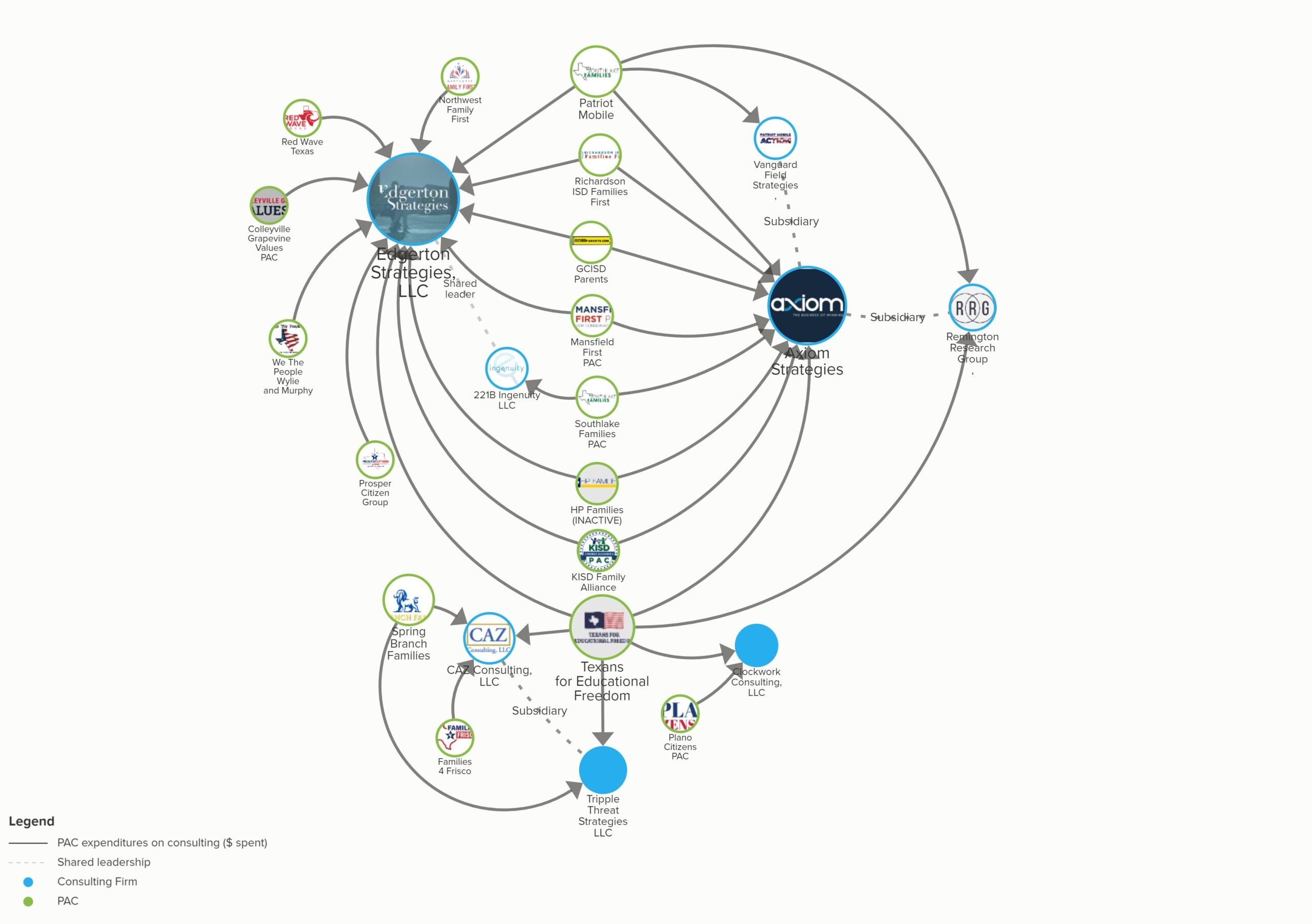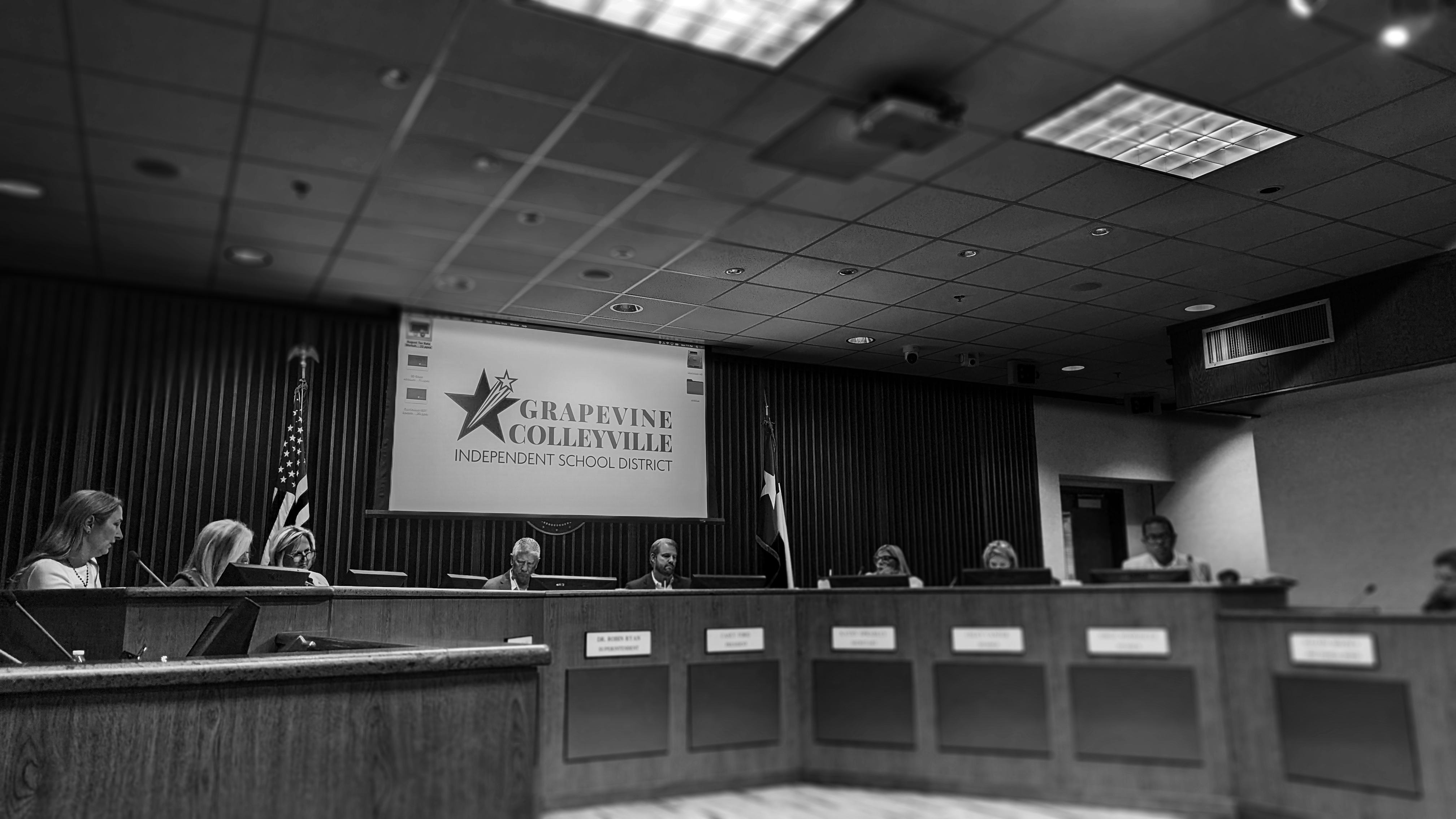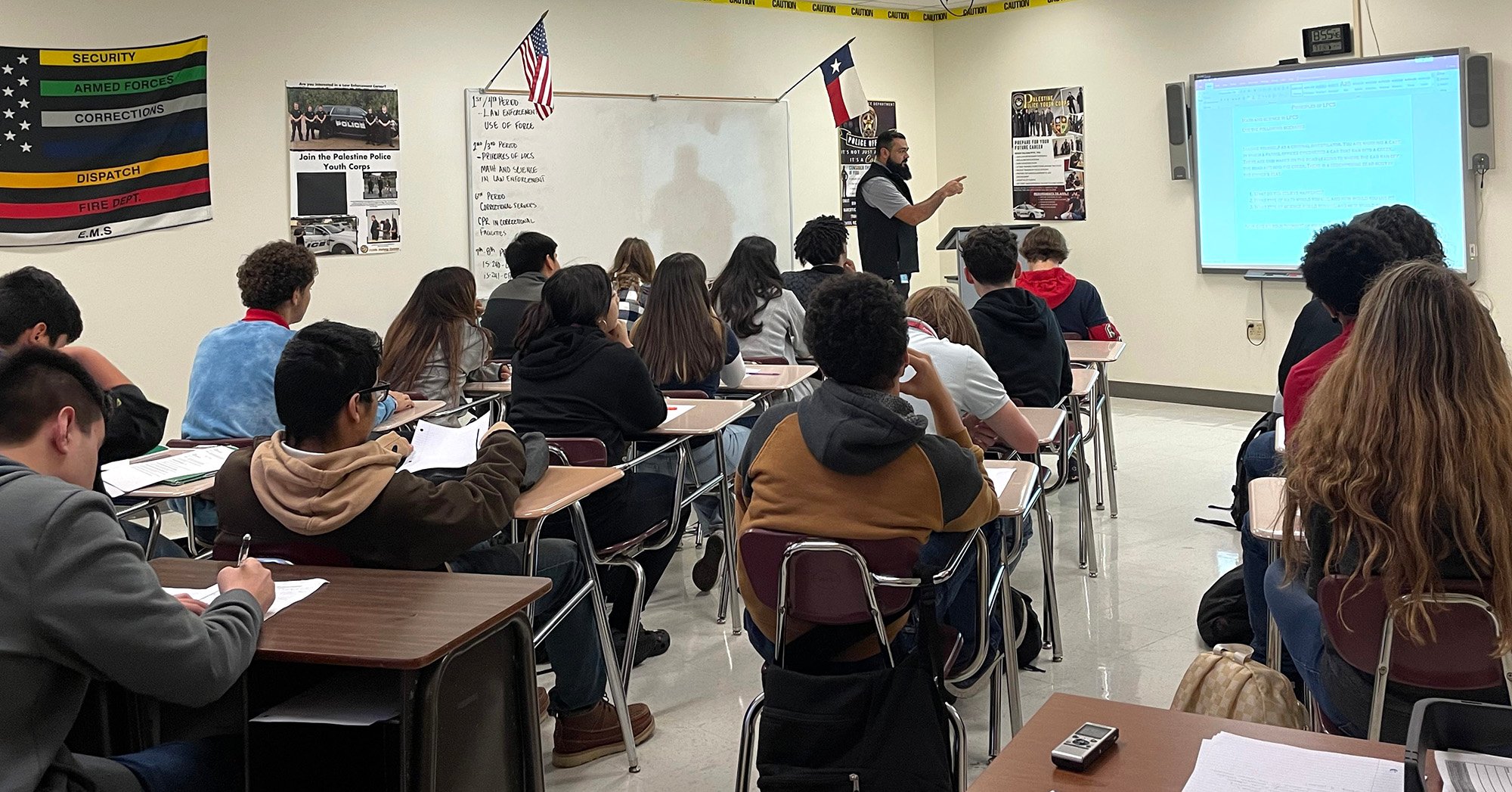Above: Parents demand the resignation of conservative Grapevine-Colleyville School Board Trustee Tammy Nakamura.
Over the last three years, an interconnected network of political action committees (PACs), largely funded by billionaires who support school privatization, has begun to transform the nature of local school board elections across Texas. They’ve done this with the help of consultants whose efforts have largely gone unnoticed.
On August 15, 2022, members of the Carroll Independent School District (CISD) board of trustees, all dressed in Southlake Dragons’ green, posed for a photo with representatives of Patriot Mobile, a Christian Nationalist phone company that spent big last spring to help secure the victories of three trustees. The occasion honored the company’s donation of posters that read “In God We Trust.”
The trustee’s acceptance of the red, white, and blue star-spangled posters immediately drew opposition from critics who see those words not just as a motto that appears on dollar bills, but also as a declaration of allegiance to conservative causes. One disapproving parent attempted to donate signs with the same words in Arabic and on a rainbow background but was rejected; the board president said they already had enough.
Other school districts got the posters around the same time. And not all parents who spoke out were critical.
Erik Leist, who resides in the neighboring Keller ISD area, spoke to multiple news outlets about the posters after they were donated. He approved of the state law passed in 2021 that requires schools to display donated signs bearing the national motto in a “conspicuous place.”
“If it’s important to communities, the community will come behind it,” Leist said, according to accounts published in Fox News and the Texas Tribune that identified him only as the father of a kindergartener.
Leist, however, is much more than a concerned dad: He’s a conservative political consultant who at the time had already been paid tens of thousands of dollars by multiple PACs to support the campaigns of new ultraconservative school board members in Carroll and neighboring school districts, trustees who were eager to accept those posters and who later passed policies restricting students’ access to library books and rolling back accommodations for LGBTQ+ students.
Leist is just one well-connected node in a sprawling, hydra-like network of PACs and consulting firms that increasingly are targeting Texas school board races and politicizing those formerly low-budget, nonpartisan campaigns, an investigation by the Texas Observer reveals.
The Observer’s examination of campaign finance records shows that dozens of ultraconservative school board candidates around the state have been backed by PACs that collectively employ a handful of conservative political consulting firms.
Viewed together, the connections among these individuals and organizations reveal a network of major funders and political operatives focused on winning control of the state’s local school boards. The strategy this network employs has been trumpeted in the right-wing press as a blueprint for school board takeovers: Create a PAC, endorse candidates willing to run on politicized issues, hire a consulting firm with ties to the Republican Party, raise enough to outspend opponents, and if victory is secured, pass policies that align with statewide party priorities. The biggest known backers of this network are conservative billionaires who generally don’t live in the districts being targeted but all of whom support school privatization efforts.
The timing of the network’s activities corresponds to revived efforts by Governor Greg Abbott and Republican lawmakers to support vouchers for private schools in the 2021 and 2023 legislative sessions.
The Texas Observer mapped out how this network of PACs, consultants, and funders are all linked together. Click above to interactively explore the network of connections.
To understand how this network developed over time, it’s best to begin in CISD—a district located in Southlake, a wealthy suburb of Fort Worth that is over 70 percent white. It’s where Leist got his start as a school board campaign consultant, supporting an effort praised by the conservative press as a model for other school districts.
In August 2020, the seven-member CISD board held a hearing on something called a Cultural Competence Action Plan, a proposal created in response to a 2018 viral video of Carroll high school students shouting the N-word.
Less than two weeks later, Tim O’Hare, the former chair of the Tarrant County Republican Party and current Tarrant County judge, teamed up with Leigh Wambsganss, a conservative activist and the wife of a former Southlake mayor, to create Southlake Families PAC.
In November 2020, Southlake Families PAC—which describes itself as “unapologetically rooted in Judeo-Christian values”—paid a Keller-based marketing company called 221b Ingenuity, of which Leist was a managing partner, to help set up a website to promote two conservative CISD school board candidates. They ran in opposition to the Cultural Competence Action Plan in the spring 2021 race that featured PAC-funded mailers accusing opponents of pushing “radical socialism.” Both PAC-backed candidates won.
In June 2021, the right-leaning National Review lauded Southlake Families’ victory as a “model for conservative parents confronted by similar situations around the country.” When Southlake Families helped a third candidate win a special election for a vacant CISD seat that fall, the three joined with a fourth PAC-endorsed incumbent to form a conservative majority on the board.
Since then, seven federal civil rights investigations have been opened into allegations of discrimination against Carroll students based on race, disability, and gender or sexual harassment. The most recent began in January 2023, one month after the board removed references to religion, sexual orientation, and gender identity from the district’s nondiscrimination statement, stoking further controversy and making news.
What has drawn less press attention is that the situation in Carroll has inspired a network of copycat PACs supporting conservative candidates in other historically low-budget nonpartisan school board races across the state, in which PACs and the candidates they endorsed hired from the same handful of consulting firms to help with campaigns.
Tentacles of this big-spending network have already reached more than two dozen Texas school districts. The Observer has identified 20 PACs formed since late 2020 that, through early September, have collectively spent more than $1.5 million to support the campaigns of 105 conservative candidates in 35 districts.

Most of the time, that investment has paid off: 65 PAC-supported candidates—or 62 percent—won their elections from 2021 to 2023.
The majority of those PACs are focused on only one school district each. The ultraconservative committees have typically spent tens of thousands of dollars per election, with less than $100,000 in total expenses since they were formed. A handful of PACs have spent more than six figures in total, including Southlake Families, which has spent more than $239,000 since late 2020.
Campaign finance records show that these seemingly grassroots groups often use the same consulting firms like Leist’s Edgerton Strategies, which has worked on behalf of PACs and candidates in at least 14 school districts. Other consulting firms that have made over six figures working on school board campaigns include Axiom Strategies and CAZ Consulting—and both companies’ subsidiaries. They’re the same consultants used by big-spending conservative political PACs like Patriot Mobile Action and Texans for Educational Freedom, which have respectively spent more than $500,000 and $330,000 on school board races and together have endorsed 66 candidates across at least 23 districts.
At least one federal-level super PAC, the 1776 Project, has also invested in 28 school board candidates across eight Texas school districts that were also endorsed by either Patriot Mobile Action, Texans for Educational Freedom, or one of the Southlake Families-style PACs.
This level of outside spending is highly unusual in school board races. The results of a 2018 survey conducted by the National School Board Association showed that 75 percent of all candidates reported spending less than $1,000 per race, with only 9 percent spending more than $5,000.
Analysis of campaign expenses by the nonprofit OpenSecrets shows that spending more money doesn’t always ensure victory—but often does. Given the relatively low cost of school board races, the influx of even a few thousand dollars of outside funding can transform the nature of such elections at a time of high turnover: According to a 2022 survey from School Board Partners, a national organization focused on recruiting and training anti-racist school board members, nearly two-thirds of school board members nationwide said they planned not to seek reelection.
This is extremely abnormal. This level of funding brings the possibility of raising the cost of being a legitimate candidate.
“This is extremely abnormal,” said Sarah Reckhow, a professor of political science at Michigan State University who has written two books about outside funding of school board elections. “This level of funding brings the possibility of raising the cost of being a legitimate candidate.”
Still, she said, if higher spending causes voters to be more engaged in low-profile elections and recognize that other people are influencing their school district, “then maybe that’s a good thing.”
In the southeast Texas city of Humble, another 2021 school board race became a quieter testing ground for a new conservative PAC. Unlike in Carroll ISD, there was no dramatic national coverage or clash over diversity and inclusion. The district, in one of Houston’s sprawling and forested northern suburbs, was the first foray into school board races for Texans for Educational Freedom, a PAC with a mission of “fighting against Critical Race Theory and other anti-American agendas and curriculums.”
Funded primarily by a coterie of conservative billionaires, Texans for Educational Freedom—originally known as the Freedom Foundation of Texas—was founded in early 2021 by Christopher Zook Jr., a former field director for the Harris County Republican Party and senior fellow at Texans For Lawsuit Reform.
In the May 2021 election, the PAC spent more than $10,000 to help three candidates—a significant investment from one source, given that Humble school board candidates tended to spend only about $3,300 from all contributors in contested races. The PAC money was spent on a national political consulting firm called Axiom Strategies. All three of the PAC’s candidates won.
Unlike in majority-white Southlake, the school board election in Humble—where white students are a minority—didn’t feature inflammatory, politicized rhetoric. That helped Texans for Educational Freedom keep a low profile.
“I wasn’t aware there was outside PAC spending,” said Brian Baker, a father of two students in Humble ISD. “I had been paying attention to stories in other parts of the state and I was looking out for candidates and mailers using certain buzzwords like ‘woke,’ but I didn’t really notice any.”
After the initial victory in Humble, Texans for Educational Freedom targeted two more districts near Houston, Cypress-Fairbanks and Klein, in 2021. This time, messaging around critical race theory came to the fore. All three PAC-backed candidates in Cypress-Fairbanks ran against the ostensible inclusion of critical race theory in school curriculum and teacher training, as did one PAC-backed candidate in Klein. Six of the seven candidates won.
By the end of 2021, candidates backed by Texans for Educational Freedom had established near or outright majorities in all three districts—and all three would later rank on a list of book-banning districts put together by PEN America, a nonprofit organization focused on the protection of free expression.
Texans for Educational Freedom has intervened in races across the greater Houston area, including Houston, Conroe, Katy, and Spring Branch. The PAC has also backed candidates in the wooded Austin suburb of Leander, in the oil-rich flats of Midland, in several suburbs of Fort Worth, and in the Panhandle’s Canyon ISD. The PAC backed 12 candidates in 2021, 10 in 2022, and 20 in 2023, covering a total of 17 school districts. Out of all those candidates, 76 percent won their elections.
“Things like this have happened before but not in such a coordinated way,” said Ruth Kravetz, a retired public school administrator and teacher who co-founded Community Voices for Public Education, an advocacy group that seeks to strengthen Houston’s public school system. “In the past it was to promote charter expansion. And now it seems like it’s about promoting the destruction of public education.”
Candidates backed by Texans for Educational Freedom have regularly run on hot-button issues that tie in with state-level Republican policy and rhetoric, such as notions that children are being “indoctrinated” into radical ideologies or “sexually alternative lifestyles.”
In Conroe ISD, three candidates backed by Texans for Educational Freedom ran as the “Mama Bear” slate and won their November 2022 elections after being involved in a push by a group known as Mama Bears Rising to restrict student access to certain books.
“The PACs were able to support a massive printing of voter guides and distribution of mailers,” said Evan Berlin, a resident who lost to one of the Mama Bears. Berlin, a first-time school board candidate who has a conservative voting record, told the Observer he wanted to run on providing education in a non-politicized manner. “I think with PAC money coming from out-of-district donors, just by nature of that we could assume that it’s part of a larger, more strategic effort,” he said.
Last year, while Texans for Educational Freedom was concentrating on Houston area races, Patriot Mobile Action and another 17 PACs were backing candidates in 22 districts across the Dallas-Fort Worth area. Those candidates largely ran on issues that have become a common refrain: allegations of ideological indoctrination, critical race theory, pornography in schools, and the sexualization of children.
Fifteen of the 18 PACs targeting North Texas school districts tapped either Axiom Strategies, Edgerton Strategies, or CAZ Consulting for campaign consulting—as did many school board candidates in the area. The outliers were: McKinney First PAC, which endorsed candidates that worked with those consulting firms; Metroplex Citizens for a Better Tomorrow and Decatur ISD Parents Unite, two groups primarily funded by a Republican mega donor who has contributed to Texans for Educational Freedom; and Collin Conservatives United, a self-described PAC that does not appear in the state PAC registry, whose endorsed candidates received donations from the same megadonor.
As this larger cluster of PACs and consulting firms has grown, its strategy has proved potent. Fourteen of its 17 candidates won in 2021. Another 42 candidates ran in 2022 and 27 won. And so far in 2023, 48 more candidates ran and 26 won.
By September 2023, PAC-supported candidates had established majorities in at least eight districts: Carroll, Grapevine-Colleyville, Humble, Katy, Keller, Klein, Mansfield, and Spring Branch. And these efforts are continuing.
The recurring appearance of certain consulting firms and big donors across supposedly nonpartisan school board races appears to have been planned or coordinated statewide, if not beyond. In December 2021, the Republican Party of Texas championed PAC-backed victories in Carroll and Cypress-Fairbanks school districts and explicitly stated the party’s intention “to play a greater role in non-partisan races and ballot propositions” and focus on recruiting and resource sharing.
“It is no coincidence that this initiative comes at the same time President Biden’s Department of Justice is attempting to suppress parental involvement in local elections by threatening to treat parents as terrorists for becoming involved in their children’s education,” wrote Texas GOP Chairman Matt Rinaldi. “Democrats across the country see the importance of local elections in the fight for America, and so does the Texas GOP.”
In August 2022, Shannon Braun, a Grapevine-Colleyville ISD (GCISD) trustee and current president of the board, wrote an opinion piece for the conservative website the Dallas Express titled “What Happened in GCISD Isn’t an Accident, It’s a Model.”
“I take comfort in knowing that none of this happened by accident. It was in fact a deliberate course of action that can be replicated in any community across Texas.”
“I take comfort in knowing that none of this happened by accident,” Braun wrote. “It was in fact a deliberate course of action that can be replicated in any community across Texas, so long as there are enough people willing to take a stand and take the heat that comes with it.”
Braun was endorsed in 2021 by GCISD Parents, a local PAC that as of 2023 had paid both Edgerton Strategies and Axiom Strategies for consulting services. Braun also directly hired Leist as a consultant and was endorsed by Wambsganss of Southlake Families PAC.
During her 2021 race, Braun spent over $30,000—more than three times her incumbent opponent—to defeat Mindy McClure, a long-time PTA volunteer and former Republican precinct chair.
“I didn’t see it coming,” McClure told the Observer. “But looking back, it’s clear to me that there was a lot of outside money and coordination. It made the race more political than local.”
Since her election, Braun has joined with other newly elected conservative school board members to pass policies that mirror statewide Republican priorities, including limiting how teachers talk about race, gender, and sexuality, and restricting bathroom access for transgender students.
Among Braun’s allies on the school board is Tammy Nakamura, a former Colleyville City Council member who endorsed Braun’s 2021 campaign. Nakamura’s 2022 school board candidacy was endorsed by GCISD Parents and Patriot Mobile Action and assisted by Edgerton Strategies.

The largest out-of-district donor to Nakamura’s campaign was Monty Bennett—the Republican mega donor publisher of the Dallas Express. Since 2021, Bennett has donated over $75,000 to candidates and PACs across seven school board races, including $7,000 to Texans for Educational Freedom.
Asked about his motivations for the donations, Bennett said, “Access to quality education should not be denied to any child, even when government can’t or won’t provide it.”
While Patriot Mobile Action is primarily funded with money from the Christian nationalist cell phone company, some conservative billionaires have forked over big bucks to school board PACs, including Houston real estate mogul Richard Weekley, who contributed $152,500 to Texans for Educational Freedom. He also gave $1,237,500 to the Coalition Por/For Texas, a PAC founded by Dallas real estate mogul Harlan Crow; the PAC transferred $150,000 of its funds to Texans for Educational Freedom. Then there’s Fred Saunders and his son Stuart Saunders of the wealthy Houston area banking family, who together have contributed $297,500 to Texans for Educational Freedom, and James Leininger, the Texas Public Policy Foundation founder and longtime school voucher proponent who donated $70,000 to Texans for Educational Freedom.
Bennett, Weekley, and Crow are all supporters of Texans for Educational Reform, an advocacy organization and PAC that has pushed for school privatization and vouchers since 2014.
McClure, the former GCISD trustee who was unseated by a PAC-backed candidate, believes that this seemingly coordinated effort to take over school boards has a larger agenda.
“There’s a lot of money in education,” McClure said. “I think it’s ultimately all an effort to support the push for school vouchers.”
This is about dismantling public education as we’ve always known it to exist by disrupting it from the inside.
Anne Russey, a parent of two children in Katy ISD schools, has been a vocal critic of the district’s new PAC-backed conservative majority.
“This isn’t just about gaining control over school boards,” Russey said. “This is about dismantling public education as we’ve always known it to exist by disrupting it from the inside.”
Where conservative school board majorities have been secured with the support of a similar set of PACs and consultants, trustees have passed similar policies.
In 2022, new PAC-backed conservative majorities passed a range of new policies in the Carroll, Mansfield, Keller, Klein, Spring Branch, and Grapevine-Colleyville districts, affecting things like access to certain books, the ability of LGBTQ+ students to use certain bathrooms, and how staff discusses issues of race, gender, and sexuality. In Frisco, where only two of four PAC-backed candidates won, the board passed a policy restricting transgender students from using their preferred bathrooms—spurring a complaint from the Texas chapter of the American Civil Liberties Union.
In June, PAC-backed trustees in Keller ISD voted to adopt controversial policies regarding pronoun and bathroom use, effectively requiring teachers to deny the chosen gender identity of students. And in late August, the Katy ISD board began requiring staff to inform parents if their children identify as transgender or choose to use a different name or pronouns at school.
“This policy is a direct assault on trans students and other marginalized groups of students who don’t have a sufficient voice in policymaking,” said Cameron Samuels, who graduated from Katy schools in 2022. “So many trans students spoke at the board meeting where they passed the anti-trans policy, including myself. But they ultimately passed the policy after four hours of public comment, which was not a surprise at all. That’s what they were elected to do.”
Samuels, a queer person who uses they/them pronouns, had been very active at Lake High School in organizing against the attempts to remove LGBTQ+-friendly books. As a freshman, they discovered that LGBTQ+ resources like The Trevor Project were blocked on the school internet, and with the help of the American Civil Liberties Union, they got it unblocked. Now a graduate, Samuels is the executive director of Students Engaged in Advancing Texas, a nonprofit they co-founded to help organize student advocacy in policy-making.
“Katy is following a trend that matches many other school districts in the state,” Samuels told the Observer.
Whether this political network will continue to expand its influence to more school board races is uncertain. Recent defeats of PAC-backed candidates in Plano, McKinney, Frisco, and Richardson suggest that organized grassroots opposition groups have prevented highly funded right-wing school board takeovers.
Tarrah Lantz, a longtime PTA volunteer and a former president of the Plano ISD Council of PTAs, looked at campaign finance reports from other school board elections in Tarrant County and knew what was coming when she decided to run for Plano school board in May 2023. Lantz sent out mailers about the threat of outside influence and called out a slate of three candidates who she said were working with “the same Keller-based campaign consulting firm as Patriot Mobile Action, a cell phone company with an extremist agenda which led the recent takeover of Keller, Southlake, Carroll and Grapevine-Colleyville school boards.”
“This was on my radar,” Lantz said. “I was watching what was happening across the state, and I knew that if I ran we would have a conservative effort that would try to put forth candidates to be mouthpieces for people who might not have a direct interest in Plano ISD.”
She was right. Payments to Edgerton Strategies and Axiom Strategies appeared on the campaign finance reports of all three conservative candidates endorsed by the Plano Citizens’ PAC, which also paid Edgerton for consulting work. All three candidates lost, but the races proved costly for the victors.
“We had to really treat it as if we were running a campaign for state or congressional house,” Lantz told the Observer. “We had big yard signs or big road signs. We had field operations. It was massive for a school board. Unprecedented, I would think.”
Ultimately, Lantz attributes her victory to being more education-focused.
“When asked about things like safety and security at one of the first candidate forums, while my opponent said they thought the alleged existence of pornography in the library was our biggest issue, instead I talked about the bond money we have committed to safety and security and the addition of doors that can create barriers should a shooter be inside a school,” Lantz said. “They were concerned with singular issues, or they were running with an agenda.”
Even as some recent efforts by this network have faltered, new fronts have opened in the battle for education. Some school boards taken over by ultraconservative majorities are not only adopting cookie-cutter policies, they are charting courses far out of the mainstream by trying to divorce themselves from the longstanding association that trains and supports state school boards.
On March 17, the Texas GOP called on school boards to disaffiliate from the Texas Association of School Boards (TASB), an organization formed in 1949 that supports school boards with training and shared resources. The reason: TASB’s guidance regarding accommodations for transgender and gender-nonconforming students. Just ten days later, CISD’s conservative-dominated board voted to break ties with TASB. The trustees later expressed interest in joining a new organization, Texans for Excellence in Education, an explicitly conservative, newly formed nonprofit alternative to TASB.
According to corporate filings in Delaware, Texans for Excellence in Education was founded in 2021 by Dallas hospitality industry entrepreneur Adrian Verdin, an associate of Bennett’s who has often visited Bennett’s ranch. The first article about Texans for Excellence in Education appeared in Bennett’s Dallas Express. The article named a longtime Republican political consultant as the group’s public affairs manager. The consultant has started multiple organizations in the past with Bennett, including an unsuccessful attempt to launch a school voucher program in Wimberley ISD. Bennett did not respond to specific questions about these ties.
Texans for Excellence in Education promotes something they call the “Classical Social Emotional Learning” policy, which targets social issues such as “critical race theory,” “gender fluidity,” and “potentially pornographic material.” The metadata for the policy document available on the Texans for Excellence in Education website shows it was authored by someone at the law firm that employs Tim Davis, the general counsel of the Tarrant County Republican Party. The policy was first considered by the GCISD board of trustees, which since 2022 has hired two firms where Davis has worked as a partner. In September, GCISD fielded a presentation from Texans for Excellence in Education after two trustee candidates endorsed by the organization won their elections.
State Representative Nate Schatzline, who represents part of Tarrant County and also has paid Axiom Strategies and Edgerton Strategies for campaign work, lauded Carroll ISD’s move and has promoted Texans for Educational Excellence in multiple social media posts.
“An alternative to [TASB] is finally here,” Schatzline wrote. “I’m calling on every Texas ISD to leave TASB and join Texans for Excellence in Education! They’ll provide all the resources your school district needs without the leftist indoctrination of TASB!”
There’s also a growing effort by some of these school boards with new PAC-backed conservative majorities to challenge long-standing school funding formulas. School boards in Carroll and Grapevine-Colleyville have recently considered resolutions opposing “recapture” payments to the state, while boards in Keller and Spring Branch have already passed them.
The recapture system, first put into law in 1994, requires local districts with high amounts of wealth per student to send excess local property tax dollars into a general fund that is redistributed to property-poor districts. Hence the system is often referred to as “Robin Hood.”
These resolutions, in the words of one PAC-backed CISD trustee, send a clear message to the state: “We’re not going to pay you, and that could come with some consequences.”
Chris Tackett, a former member of the Granbury ISD school board who has turned himself into a campaign finance researcher, fears that the parallel efforts of these right-wing school boards may ultimately undermine the schools they’re supposedly serving.
“People generally are happy with their schools, and that’s an obstacle to vouchers. … So while vouchers are being pushed … they have to devalue the community’s perception of their local schools at the same time,” Tackett said. “And I think that’s exactly what they’re doing.”
This story and infographic are part of a series supported by a grant from the Fund for Investigative Journalism.




